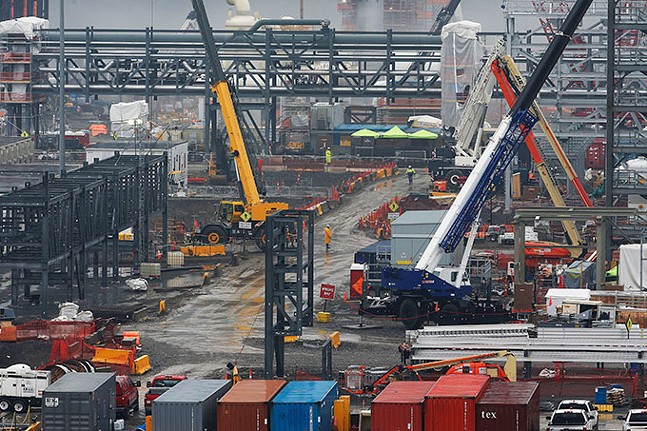
Currently, a petrochemical cracker plant is being built in Beaver County by oil giant Shell. The plant will refine natural gas, which is fracked from all over Southwestern Pennsylvania, into pellets, which can be used to make plastic products. The development has led other oil and gas companies to strongly consider the nearby Ohio River Valley as a location to host several more cracker plants.
However, Pittsburgh Mayor Bill Peduto recently spoke out in opposition to future cracker plants in the region, becoming the most prominent politician in the area to do so. Peduto said the economic vitality of the region will be hurt down the line by the pollution created by an alley of cracker plants, and will make the region unattractive to the tech companies and workers Peduto is trying to recruit. (In September, thousands of workers at Amazon, Google, and Apple protested and called for serious action to address climate change.)
This assertion was met swiftly by a rebuttal from another prominent local official, Allegheny County Executive Rich Fitzgerald. He supports the build-out of the petrochemical industry and claimed natural-gas has done wonders for the regional economy. Fitzgerald said the jobs created through these industries are necessary for areas outside of city centers and office parks.
According to a recent paper from the Journal of Urban Affairs, Pittsburgh added about 7,000 fracking jobs from 2009-2016, and those numbers have increased slightly since then. According to the Bureau of Labor Statistics, Pittsburgh has also been steadily growing its construction employment figures since 2009, including adding about 8,000 jobs since 2016, which was likely helped along by the thousands needed to build the cracker plant in Beaver County. If more cracker plants were to be built, those numbers would continue to go up.
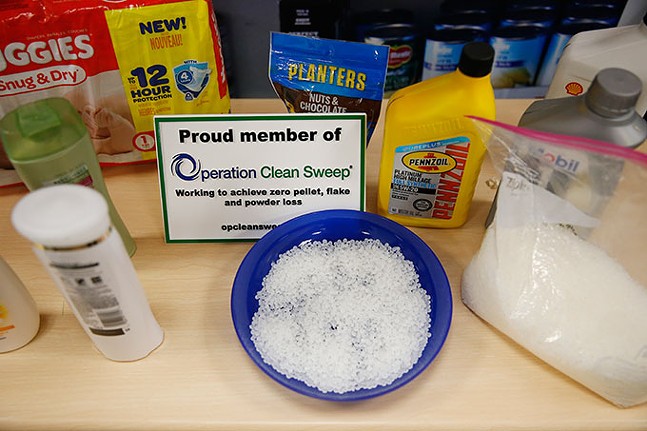
Peduto is more interested in maintaining the region's growth in tech, research, and white-collar jobs. From 2009-2016, Pittsburgh gained more than 26,000 positions in these combined categories, growing at a rate of more than 21 percent. According to the Bureau of Labor Statistics, thousands more of these white-collar jobs have continued to be added to Pittsburgh's economy. Other progressives from the region go even further than Peduto and think Pittsburgh should get behind the Green New Deal, a plan that would provide large-scale federal investments to build renewable energy plants and upgrades to the nation’s electricity grid. Green New Deal proponents say it would provide millions of jobs while working to address climate change and air quality.
With this split occurring between leaders over whether to continue to support fracking or start to transition away from it, Pittsburgh City Paper sought to determine just where Allegheny County’s elected officials stood on the issue. CP contacted and retrieved statements from 62 elected officials in that represent the county; the ones that have a say on policy related to business and energy, or those with big enough bully pulpits to effect change.
Currently, there are 25 elected officials that support pursuing future cracker plants, compared to nine that oppose new plants in the region. For eight of the politicians who provided statements to CP, it was unclear how they felt about fracking and if they supported creating more cracker plants.
Twenty state, county, and Pittsburgh city politicians, didn’t provide a statement, or declined to issue one. Five of the nine Pittsburgh City Councilors didn’t offer a statement on cracker plants or fracking, despite the fact that four of them voted to ban fracking within city limits in 2010.
Their answers, or non-answers, are listed below and have been edited for length and clarity.
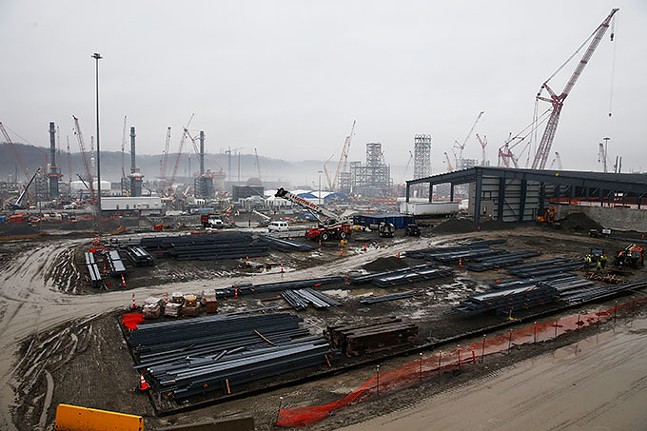
Federal
3 support, 1 unclear
U.S. Sen Bob Casey (D-Scranton) — Supports Didn’t answer questions about future cracker plants, but Casey strongly supported bringing the Shell cracker to Beaver County and also urged other companies, such as Aither Chemicals, to build a cracker plant in the region. He is supportive of fracking and told KDKA in October, “The false choice is that you have to choose fracking over good climate policy.”
U.S. Sen. Pat Toomey (R-Lehigh) — Supports
Issued a statement in October to rebuke Peduto’s comments and calls to ban fracking. "Natural gas exploration, the cracker plant, and the downstream manufacturing sector are great for Southwestern Pennsylvania,” adding, "stopping natural gas exploration or banning expansion of the petrochemical industry would ruin the region's economy.” Toomey claims fracking and cracker plants position the region to become a manufacturing hub, but Southwestern Pennsylvania has lost more than 10,000 manufacturing jobs since 2009, even as natural-gas production has grown immensely.
U.S. Rep. Mike Doyle (D-Forest Hills) — Unclear
Has walked a fine line in touting his federal efforts to pass legislation to combat climate change, while never outright condemning the natural-gas industry or cracker plants. For instance, supported cap-and-trade carbon emissions policies, but only with rebates for industries that operate in the region, such as steel. Supports net-zero carbon emissions and a 100% clean economy by 2050, and believes extractive industries like fracking can operate cleanly, if regulated.
U.S. Rep. Conor Lamb (D-Mt. Lebanon) — Supports
Told the Pittsburgh Post-Gazette in November the natural gas-industry has been, as a whole, beneficial to his district, which encompasses Allegheny County’s northern and western suburbs, as well as all of Beaver County. Said the regional economic future outside Pittsburgh city limits is “energy jobs and manufacturing.” Lamb rejects the notion of a tradeoff between jobs and environmentalism. Supports investing in technology to clean up extractive industries, but not ready to support a carbon tax.
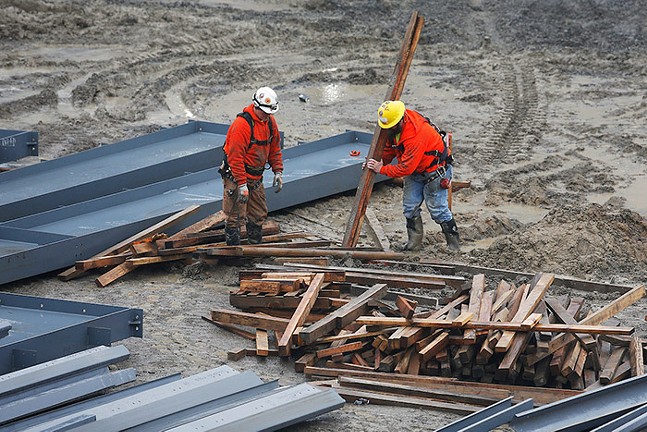
State
19 support, 3 opposed, 4 unclear, 4 no word
Gov. Tom Wolf (D-York) — Supports In a November KDKA interview, Wolf talked about his support for future cracker plants and the continuation of the natural-gas industry. Wolf said plastic created by the cracker plants could be manufactured into light-weight materials for cars. Claimed the cracker plant in Beaver County would lead to cleaner air and water, despite the fact it is permitted to emit 2.2 million tons of carbon dioxide each year. Said banning fracking wouldn’t help the transition to renewable energy, despite the fact that natural-gas and renewables are direct competitors in the energy market. Supports a severance tax on natural-gas drillers to pay for statewide infrastructure improvements.
Lt. Gov. John Fetterman (D-Braddock) — Unclear
Fervently supports Wolf’s Restore PA plan to institute a severance tax on fracking companies. Said that plans for a second cracker plant should be discussed in a way that “actually incorporates the real life experience” of cracker plant workers, and says environmental concerns can be addressed with regulation. “Let’s have an honest conversation about a path forward and not declaring an enemy of what the other might be.” During a 2016 run for U.S. Senate, Fetterman supported a moratorium on fracking in Pennsylvania. Said this past support doesn’t conflict with current stance because he called for a moratorium until environmental concerns could be addressed, and now believes they have been.
State Sen. Jim Brewster (D-McKeesport) — Support
Didn’t respond to multiple requests for comment on this story. Voted in 2012 for the $1.6 billion state incentive package to support the current Beaver County cracker plant. UPDATE: (Wed., Feb. 5) Voted for HB1100, a bill that would provide tax credits to future petrochemical facilities in Pennsylvania, at a cost of $22 million per plant per year. It is estimated to cost the state upwards of $1 billion. If enacted, the annual tax credits are good until 2050.
State Sen. Jay Costa (D-Forest Hills) — Declined comment
Costa’s spokesperson declined a request for comment from CP. Voted in 2012 for the $1.6 billion state incentive package to support the current Beaver County cracker plant. UPDATE: (Wed., Feb. 5) Voted against HB1100, a bill that would provide tax credits to future petrochemical facilities in Pennsylvania, at a cost of $22 million per plant per year. It is estimated to cost the state upwards of $1 billion. If enacted, the annual tax credits are good until 2050.
State Sen. Wayne Fontana (D-Brookline) — Unclear
Fontana said the decision to create more cracker plants ultimately lies with the counties hosting them, such as Beaver County. If local governments do support cracker plants, then encourages discussions and negotiations focused on requiring the highest environmental standards before offering any public funds. “We do not have to choose between creating good jobs and protecting our environment,” said Fontana. Supports the continued growth of Pittsburgh’s tech and start-up sectors, and said it’s “critical that working people are front and center as we create a new economy.” Voted in 2012 for the $1.6 billion state incentive package to support the current Beaver County cracker plant. UPDATE: (Wed., Feb. 5) Voted for HB1100, a bill that would provide tax credits to future petrochemical facilities in Pennsylvania, at a cost of $22 million per plant per year. It is estimated to cost the state upwards of $1 billion. If enacted, the annual tax credits are good until 2050.
State. Sen. Pam Iovino (D-Mt. Lebanon) — Unclear
Iovino spokesperson Josh Fleitman says it’s difficult to provide a yes or no answer on Iovino’s support or opposition to future cracker plants. “When we try and pit jobs against the environment, it is a lose-lose, and if we are going to find a sustainable future, we need to bring labor, nonprofits, elected officials, and environmentalists together,” said Fleitman speaking for Iovino. She believes there is a sustainable middle ground between the fractured groups. UPDATE: (Wed., Feb. 5) Voted for HB1100, a bill that would provide tax credits to future petrochemical facilities in Pennsylvania, at a cost of $22 million per plant per year. It is estimated to cost the state upwards of $1 billion. If enacted, the annual tax credits are good until 2050.
State. Sen. Lindsey Williams (D-West View) — Unclear
Doesn’t endorse a ban on fracking, but supports a severance tax on natural-gas drillers. Has said in the past that the region should eventually move away from fossil fuels, but a fracking ban “put countless Pennsylvanians out of work and cause an ecological disaster as well sites, pipelines, and other infrastructure would be abandoned by companies.” Didn’t specifically comment on any potential future cracker plants, but supports stricter inspection and enforcement of natural-gas related industries, and tax credits to encourage investing in renewable energy, as long has local union workers are utilized. UPDATE: (Wed., Feb. 5) Voted against HB1100, a bill that would provide tax credits to future petrochemical facilities in Pennsylvania, at a cost of $22 million per plant per year. It is estimated to cost the state upwards of $1 billion. If enacted, the annual tax credits are good until 2050.
House Speaker Mike Turzai (R-Marshall) — Supports
Bemoaned Peduto’s comments and said the current cracker plant is supplying thousands of jobs during its construction and is rehabilitating a formerly industrial site. “As a statewide leader, I will ensure that we remain welcoming to these industries and the family-sustaining jobs they provide,” said Turzai in a statement.” While jobs in technology and renewable energy are vital to the current and future prosperity of our region, we should not repeat the mistakes of our past by relying on those industries alone.” Voted in 2012 for the $1.6 billion state incentive package to support the current Beaver County cracker plant. UPDATE: (Wed., Feb. 5) Voted for HB1100, a bill that would provide tax credits to future petrochemical facilities in Pennsylvania, at a cost of $22 million per plant per year. It is estimated to cost the state upwards of $1 billion. If enacted, the annual tax credits are good until 2050.
House Minority Leader Frank Dermody (D-Oakmont) — Support
Didn’t respond to multiple requests for comment on this story. In 2012, Dermody voted against the $1.6 billion state incentive package to support the current Beaver County cracker plant. UPDATE: (Wed., Feb. 5) Voted for HB1100, a bill that would provide tax credits to future petrochemical facilities in Pennsylvania, at a cost of $22 million per plant per year. It is estimated to cost the state upwards of $1 billion. If enacted, the annual tax credits are good until 2050.
State Rep. Bob Brooks (R-Murrysville) — Supports
Said he supports “an expanding economy that provides for good paying and family sustaining jobs” and that it’s important to “use of the resources that our communities possesses,” which includes natural-gas reserves. Would rather see natural gas stay within the state than shipping it to other states. “Since Natural Gas is our most abundant natural resource, I encourage the locating of a cracker plant nearby to promote the same additions to local industry.” Brooks also says he supports and promotes good air quality and health improvements for area residents. UPDATE: (Wed., Feb. 5) Voted for HB1100, a bill that would provide tax credits to future petrochemical facilities in Pennsylvania, at a cost of $22 million per plant per year. It is estimated to cost the state upwards of $1 billion. If enacted, the annual tax credits are good until 2050.
State Rep. Austin Davis (D-McKeesport) — Supports
Didn’t respond to multiple requests for comment on this story. UPDATE: (Wed., Feb. 5) Voted for HB1100, a bill that would provide tax credits to future petrochemical facilities in Pennsylvania, at a cost of $22 million per plant per year. It is estimated to cost the state upwards of $1 billion. If enacted, the annual tax credits are good until 2050.
State Rep. Dan Deasy (D-West End) — Supports
Didn’t respond to multiple requests for comment on this story. Deasy voted in 2012 for the $1.6 billion state incentive package to support the current Beaver County cracker plant. UPDATE: (Wed., Feb. 5) Voted for HB1100, a bill that would provide tax credits to future petrochemical facilities in Pennsylvania, at a cost of $22 million per plant per year. It is estimated to cost the state upwards of $1 billion. If enacted, the annual tax credits are good until 2050.
State Rep. Tony DeLuca (D-Penn Hills) — Supports
Didn’t respond to multiple requests for comment on this story. DeLuca voted in 2012 for the $1.6 billion state incentive package to support the current Beaver County cracker plant. UPDATE: (Wed., Feb. 5) Voted for HB1100, a bill that would provide tax credits to future petrochemical facilities in Pennsylvania, at a cost of $22 million per plant per year. It is estimated to cost the state upwards of $1 billion. If enacted, the annual tax credits are good until 2050.
State Rep. Dan Frankel (D-Squirrel Hill) — Opposes
Voted against the $1.6 billion state incentive package in 2012 to support the current Beaver County cracker plant because he remembers the legacy needs involved in environmental cleanup of other polluting industries. Said there is an urgent need to regulate polluters already present in the region and needs additional resources to regulate fracking and soon-to-be cracker plant, with possible additional regulations. Said the region is well positioned to move renewable energy forward, with state and local backing. “We should be investing in sustainable and renewable energy solutions, which I believe will be a source of good-paying jobs in the future.” UPDATE: (Wed., Feb. 5) Voted against HB1100, a bill that would provide tax credits to future petrochemical facilities in Pennsylvania, at a cost of $22 million per plant per year. It is estimated to cost the state upwards of $1 billion. If enacted, the annual tax credits are good until 2050.
State Rep. Ed Gainey (D-East Liberty) — No response
Didn’t respond to multiple requests for comment on this story.
State Rep. Valerie Gaydos (R-Sewickley) — Supports
Said future cracker plants “will no doubt result in a substantial economic boom to the region” and believes they can be achieved in an environmentally safe manner and adhere to environmental regulations. Added that plans for renewable energy and upgrades to existing infrastructure shouldn’t be excluded from economic development. Says the local tech industry can play a part in that growth. “In fact, having both or all will work to further propel Pittsburgh and the surrounding regions into being a world-class economy.” UPDATE: (Wed., Feb. 5) Voted for HB1100, a bill that would provide tax credits to future petrochemical facilities in Pennsylvania, at a cost of $22 million per plant per year. It is estimated to cost the state upwards of $1 billion. If enacted, the annual tax credits are good until 2050.
State Rep. Sara Innamorato (D-Lawrenceville) — Opposes
Has been vocal about the environmental and pollution concerns of the natural-gas industry. Opposes the subsidies given out to fracking companies and the cracker plant, and instead supports subsidies for renewable energy, like wind power. Tweeted last year in reference to the diverging economic paths of Pittsburgh’s economy and environmentalism, “As it stands now, we can’t have it both ways.” Tweeted this year that we’re not considering all the ramifications for propping up the natural gas and petrochemical industries. “Families living in the shadow of these industries are forgoing their future wealth with sinking property values while municipalities foot the bill for infrastructure costs exacerbated by climate change.” UPDATE: (Wed., Feb. 5) Voted against HB1100, a bill that would provide tax credits to future petrochemical facilities in Pennsylvania, at a cost of $22 million per plant per year. It is estimated to cost the state upwards of $1 billion. If enacted, the annual tax credits are good until 2050.
State Rep. William Kortz (D-Dravosburg) — Supports
Didn’t respond to multiple requests for comment on this story. Kortz voted in 2012 for the $1.6 billion state incentive package to support the current Beaver County cracker plant. UPDATE: (Wed., Feb. 5) Voted for HB1100, a bill that would provide tax credits to future petrochemical facilities in Pennsylvania, at a cost of $22 million per plant per year. It is estimated to cost the state upwards of $1 billion. If enacted, the annual tax credits are good until 2050.
State Rep. Anita Kulik (D-Kennedy) — Supports
Didn’t respond to multiple requests for comment on this story. UPDATE: (Wed., Feb. 5) Voted for HB1100, a bill that would provide tax credits to future petrochemical facilities in Pennsylvania, at a cost of $22 million per plant per year. It is estimated to cost the state upwards of $1 billion. If enacted, the annual tax credits are good until 2050.
State Rep. Summer Lee (D-Swissvale) — Opposes
Since starting her campaign in 2018, Lee has opposed the fracking industry and the build-out of cracker plants in the region. Voiced opposition to fracking proposals at the Edgar Thomson Steel Facility in Braddock. Has decried “environmental racism” of the region, in which Black communities are disproportionately affected by the pollution of heavy industry. Supports the Green New Deal. UPDATE: (Wed., Feb. 5) Voted against HB1100, a bill that would provide tax credits to future petrochemical facilities in Pennsylvania, at a cost of $22 million per plant per year. It is estimated to cost the state upwards of $1 billion. If enacted, the annual tax credits are good until 2050.
State Rep. Brandon Markosek (D-Monroeville) — Supports
Didn’t respond to multiple requests for comment on this story. UPDATE: (Wed., Feb. 5) Voted for HB1100, a bill that would provide tax credits to future petrochemical facilities in Pennsylvania, at a cost of $22 million per plant per year. It is estimated to cost the state upwards of $1 billion. If enacted, the annual tax credits are good until 2050.
State Rep. Robert Matzie (D-Ambridge) — Supports
Said he supports any industry to the region, as long as it adheres to the highest environmental and zoning regulations. Believes that the region can see cleaner energy and manufacturing move into the region, and rejects a correlation between manufacturing expansion and growing the tech economy. Calls the Green New Deal “an interesting concept” but downplays it has merely a concept. Voted in 2012 for the $1.6 billion state incentive package to support the current Beaver County cracker plant. UPDATE: (Wed., Feb. 5) Voted for HB1100, a bill that would provide tax credits to future petrochemical facilities in Pennsylvania, at a cost of $22 million per plant per year. It is estimated to cost the state upwards of $1 billion. If enacted, the annual tax credits are good until 2050.
State Rep. Dan Miller (D-Mt. Lebanon) — Supports
Didn’t respond to multiple requests for comment on this story. UPDATE: (Wed., Feb. 5) Voted for HB1100, a bill that would provide tax credits to future petrochemical facilities in Pennsylvania, at a cost of $22 million per plant per year. It is estimated to cost the state upwards of $1 billion. If enacted, the annual tax credits are good until 2050.
State Rep. Natalie Mihalek (R-Upper St. Clair) — Supports
Didn’t respond to multiple requests for comment on this story. UPDATE: (Wed., Feb. 5) Voted for HB1100, a bill that would provide tax credits to future petrochemical facilities in Pennsylvania, at a cost of $22 million per plant per year. It is estimated to cost the state upwards of $1 billion. If enacted, the annual tax credits are good until 2050.
State Rep. Lori Mizgorski (R-Shaler) — Supports
Didn’t respond to multiple requests for comment on this story. UPDATE: (Wed., Feb. 5) Voted for HB1100, a bill that would provide tax credits to future petrochemical facilities in Pennsylvania, at a cost of $22 million per plant per year. It is estimated to cost the state upwards of $1 billion. If enacted, the annual tax credits are good until 2050.
State Rep. Jason Ortitay (R-Cecil) — Supports
Didn’t respond to multiple requests for comment on this story. UPDATE: (Wed., Feb. 5) Voted for HB1100, a bill that would provide tax credits to future petrochemical facilities in Pennsylvania, at a cost of $22 million per plant per year. It is estimated to cost the state upwards of $1 billion. If enacted, the annual tax credits are good until 2050.
State Rep. Michael Puskaric (R-Elizabeth) — Supports
Didn’t respond to multiple requests for comment on this story. UPDATE: (Wed., Feb. 5) Voted for HB1100, a bill that would provide tax credits to future petrochemical facilities in Pennsylvania, at a cost of $22 million per plant per year. It is estimated to cost the state upwards of $1 billion. If enacted, the annual tax credits are good until 2050.
State Rep. Adam Ravenstahl (D-North Side) — Supports
Didn’t respond to multiple requests for comment on this story. Voted in 2012 for the $1.6 billion state incentive package to support the current Beaver County cracker plant. UPDATE: (Wed., Feb. 5) Voted for HB1100, a bill that would provide tax credits to future petrochemical facilities in Pennsylvania, at a cost of $22 million per plant per year. It is estimated to cost the state upwards of $1 billion. If enacted, the annual tax credits are good until 2050.
State Rep. Harry Readshaw (D-Carrick) — Supports
Didn’t respond to multiple requests for comment on this story. Voted in 2012 for the $1.6 billion state incentive package to support the current Beaver County cracker plant. UPDATE: (Wed., Feb. 5) Voted for HB1100, a bill that would provide tax credits to future petrochemical facilities in Pennsylvania, at a cost of $22 million per plant per year. It is estimated to cost the state upwards of $1 billion. If enacted, the annual tax credits are good until 2050.
State Rep. Jake Wheatley (D-Hill District) — No response
Didn’t respond to multiple requests for comment on this story. Voted against the $1.6 billion state incentive package in 2012 to support the current Beaver County cracker plant.
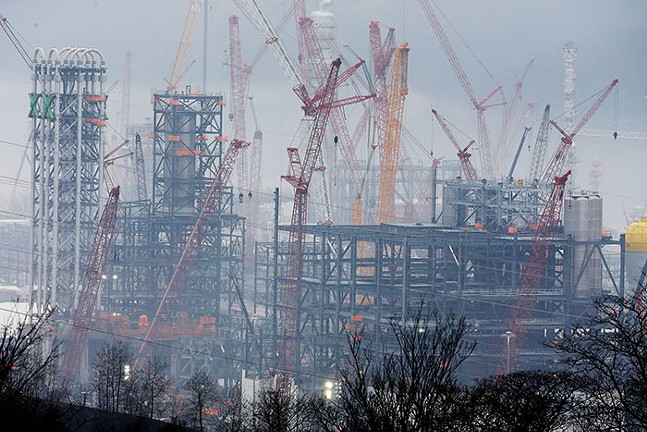
County
3 support, 3 opposed, 11 no word
Allegheny County Executive Rich Fitzgerald (D-Squirrel Hill) — Supports Said in an October interview on KDKA radio that “No city has benefited more from the shale revolution than the city of Pittsburgh. No region has benefited more. Not just our county, the entire region.” Supported fracking on county-owned land at Deer Lakes Park and the Pittsburgh International Airport. Said the fracking industry has given economic hope for the region after the collapse of steel in the 1980s. Said he’s met with companies often looking to move to Pittsburgh and they never bring up environmental issues related to the cracker plant.
Allegheny County Controller Chelsa Wagner (D-Point Breeze) — No response
Wagner spokesperson Tracy Royston said the controller isn’t prepared to make a comment at this time.
Allegheny County Councilor Tom Baker (R-Ross) — No response
Voted in favor of allowing fracking on county owned property in Deer Lakes Park and the Pittsburgh International Airport.
Incoming Allegheny County Councilor Liv Bennett (D-North Side) — Opposes
Said she opposes the future development of cracker plants in the region. Supports the Green New Deal to “bring clean jobs to our region” that would “provide employment while also ensuring that the residents in our region are able to breathe clean air and drink clean water.” Agrees the cracker plants will be built outside of Allegheny County, but said the pollution produced by these plants will have an impact on the surrounding counties, including Allegheny County.
Allegheny County Councilor Patrick Catena (D-Carnegie) — No response
Didn’t respond to multiple requests for comment on this story.
Allegheny County Councilor Sam DeMarco (R-North Fayette) — Supports
Called Peduto’s comments reckless and supports the build-out of the petrochemical industry. “These new facilities are expected to create dozens of spinoff plants in the vicinity, all of them bringing jobs and financial security to the region.” Said the natural-gas industry has played an important role in reducing greenhouse gas emissions. He is calling on other regional leaders and state leaders to denounce Peduto’s comments.
Incoming Allegheny County Councilor Tom Duerr (D-Bethel Park) — No response
Didn’t respond to multiple requests for comment on this story.
Allegheny County Councilor Nick Futules (D-Oakmont) — Supports
Says the cracker plant is a job creator that is going to create thousands of jobs, and he wouldn't be opposed to more plants, on a case-by-case basis. Noted that county council as a body, has supported the buildout of the natural-gas industry with votes to permit fracking at Deer Lakes, PIT airport, and Allegheny County airport. Futules personally supported all these initiatives.
Incoming Allegheny County Councilor Bethany Hallam (D-Ross) — Opposes
When asked if she supports future cracker plants, Hallam replied “absolutely not.” Said that it’s “important to start preparing our local union workers for jobs in renewable energy.” She is also opposed to fracking. “No one should have to choose between well-paying jobs and a safe, healthy environment.”
Allegheny County Councilor Cindy Kirk (R-Wexford) — No response
Didn’t respond to multiple requests for comment on this story.
Allegheny County Councilor Paul Klein (D-Point Breeze) — No response
Didn’t respond to multiple requests for comment on this story.
Allegheny County Councilor Bob Macey (D-West Mifflin) — No response
Macey has been a vocal supporter of fracking and voted in favor of allowing fracking on county owned property in Deer Lakes Park and the Pittsburgh International Airport
Allegheny County Councilor Robert Palmosina (D-Banksville) — No response
Didn’t respond to multiple requests for comment on this story.
Allegheny County Councilor Anita Prizio (D-O’Hara) — Opposes
Is vocally opposed to the future development of the petrochemical industry in the region. Is wary of cracker plants since they create plastic. Said the plastic industry creates a serious waste problem, since only about 10% of plastic waste is being recycled. Would rather see plants converted into thermochemical recycling plants, which could transform plastic factories into recycling refineries, within the framework of their existing infrastructure. Said region should be wary of recreating the petrochemical alley like in Louisiana, which has shown to have high rates of cancer for area residents.

City
3 opposed, 3 unclear, 5 no word
Pittsburgh Mayor Bill Peduto (D-Point Breeze) — OpposesAnnounced his opposition to future cracker plants in October and proclaimed, “We don’t have to become the petrochemical/plastics center of the United States.” He told PublicSource that the Pittsburgh region should be investing in environmental clean-up and green energy jobs instead of fracking and related industries. Rejects the belief that environmentalist are anti-business.
Pittsburgh Controller Michael Lamb (D-Mt. Washington) — Unclear
Said climate change is real and is confident that carbon dioxide and methane emissions are contributing to global warming and exacerbating air quality. Advocated for a future of renewable energy, but claimed the energy storage sector is not currently advanced enough to permit us to rely solely on renewable energy sources. Wants fracking more appropriately regulated and adequately taxed. Opposes government subsidies to any future cracker plants, since the industries are already attracted to the region. Supports investment in making energy infrastructure more efficient, growing pollution reduction efforts of existing industry and additional research and development of clean energy alternatives.
Pittsburgh City Councilor Ricky Burgess (D-Point Breeze) — No response
Didn’t respond to multiple requests for comment on this story. Burgess voted to ban fracking within Pittsburgh city limits in 2010.
Pittsburgh City Councilor Anthony Coghill (D-Beechview) — Unclear
"My primary focus is on job creation in our region and assuring that those jobs are completed in conjunction with our local labor unions. Job growth must continue to happen in Southwestern PA in order to assure that our region and workers continue to thrive. In Pittsburgh, I feel that we have the ability to include many types of businesses in our growing economy; whether those jobs are in natural gas, green energy, technology, or healthcare — we must assure that Pittsburgh is a region where everyone has opportunity."
Pittsburgh City Councilor Deb Gross (D-Highland Park) — Opposes
Said she is happy to join Lee, Innamorato, Peduto, and Prizio in opposing future cracker plants. Gross questioned just how many jobs related to the cracker plant have been filled by locals, especially city residents. “Let us not trade our wealth and health to prop up a dying industry for someone else’s benefit or the profits for their corporate shareholders.” Said Pittsburgh can create clean energy and light manufacturing jobs, especially when tapping into research at area universities and the skills of the local trade unions.
Pittsburgh City Councilor Theresa Kail-Smith (D-West End) — No response
Didn’t respond to multiple requests for comment on this story. Kail-Smith voted to ban fracking within Pittsburgh city limits in 2010.
Pittsburgh City Councilor Bruce Kraus (D-South Side) — No response
Didn’t respond to multiple requests for comment on this story. Kraus voted to ban fracking within Pittsburgh city limits in 2010.
Pittsburgh City Councilor Daniel Lavelle (D-Hill District) — No response
Didn’t respond to multiple requests for comment on this story. Lavelle voted to ban fracking within Pittsburgh city limits in 2010.
Pittsburgh City Councilor Corey O’Connor (D-Squirrel Hill) — Unclear
A statement from O’Connor’s office said the councilor is “committed to working towards a just transition from fossil fuels to build a more sustainable economy.” But he didn’t want to comment on proposed development outside of Pittsburgh, out of respect to the deliberations of residents and local leaders in those locations.
Pittsburgh City Councilor Erika Strassburger (D-Shadyside) — Opposes
Tweeted in November that she opposes the build out of the petrochemical industry: “A clean energy future CAN provide good labor jobs. Don’t tell me it’s not possible.” Rejects the notion that cracker plants are clean and tweeted that emissions associated with the cracker plant in Beaver County alone will negate Pittsburgh's entire climate action plan.
Incoming City Councilor Bobby Wilson (D-North Side) — No response
Didn’t respond to multiple requests for comment on this story.
Editor's Note (Wed. Feb. 5) This story has been updated as indicated above with new information.















